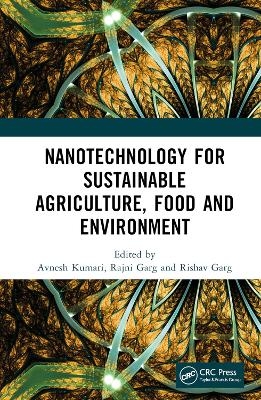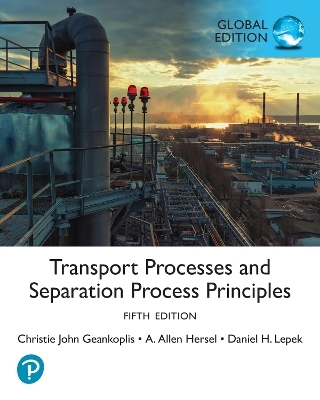
Nanotechnology for Sustainable Agriculture, Food and Environment
CRC Press (Verlag)
978-1-032-50301-1 (ISBN)
Nanotechnology has the potential to drastically transform the agri-food sector with its significant applications to improve agricultural productivity and the efficiency of agrochemicals. The food sector has benefitted from the inclusion of nanoparticles in food matrixes and the nanoencapsulation of nutraceuticals. Smart packaging materials designed with the help of nanotechnology have been used for increasing the shelf life of stored food products. Nanomaterials have been extensively used for the delivery of important agrochemicals to enhance their bioefficacy, prevent their degradation, and control their release. Various nanomaterials have been explored for remediation of arising environmental issues. Nanotechnology has also made a useful contribution to the utilization of huge agricultural and food wastes for production of valuable products. The existing and emerging applications of nanotechnology will contribute to environmental sustainability.
Nanotechnology for Sustainable Agriculture, Food and Environment has been structured to provide a widespread coverage and up-to-date progress of nanotechnology and its applications in the agri-food sector and environmental remediation. Synthesis of value-added nanomaterials from agri-food wastes and their potential applications in environmental remediation have been explored. In addition, toxicity issues with nanomaterials have also been discussed.
Features:
Elaborated information on the use of nanotechnology for sustainable agriculture
In-depth study about valorization of agri-food waste
An overview of applications of nanotechnology in environmental remediation
Toxicity analysis of nanotechnology-based products
We aim to satisfy the need for a reference book for scientists, researchers, academicians and students in nanotechnology, agricultural, food, nutraceuticals, environmental and material sectors.
Dr. Avnesh Kumari obtained her MSc (Hons.) Chemistry in 2001 and PhD in 2007 from the Department of Chemistry, Panjab University, Chandigarh. Subsequently, she worked as postdoctoral fellow at CSIR-IHBT, Palampur (2008-2010). She joined CSIR-Institute of Himalayan Bioresource Technology, Palampur in 2011 and is presently working there as Assistant Professor and Senior Technical Officer (2). She has been working in the area of nanobiology and electron microscopy. In nanobiology, her main work is on the improvement of solubility, bioavailability and efficacy of important phytomolecules possessing activities like antioxidant, antimicrobial and anticancer. Secondly, she has been working on the isolation of nanocellulose from different plant species and using them in different applications. She has published 49 research articles in peer reviewed journals, 5 international patents (1 granted and 4 filed) and 12 book chapters so far. Early in her career, she was a recipient of JRF and SRF fellowships from CSIR, India. She is also recipient of CSIR Quick Hire Scientist Fellow scheme. She later received a DST-Women Scientist Scheme - a postdoctoral fellowship. She has served as reviewer for several journals and is a life member of several scientific societies. Dr. Rajni Garg is working as an Associate Professor in the Department of Applied Sciences, Galgotias College of Engineering and Technology, Greater Noida (UP), India. She received her B.Sc. (Medical) at the D.A.V. College, Abohar (Punjab), India; M. Sc. (H.S.) in Chemistry, Panjab University, India; M.Phil. in Chemistry at CDLU, India and Ph.D. (Chemistry) at the GKU, India. Her areas of interest include nanochemistry, green chemistry and supramolecular chemistry. She has authored and co-authored many scientific papers printed in international and national journals, and proceedings of international and national scientific conferences. She has also published five patents on the potential applications of nanomaterials in cementitious materials. Currently, she is working on green synthesis and potential applications of nanoparticles. She serves as a reviewer for many journals and has authored one textbook with Mc-Graw Hill Publications. She is a part of large social media network on LinkedIn and Facebook with reputed scientists, academicians and researchers. She has recently successfully edited a Handbook of research on Green Synthesis and Applications of Nanomaterials published by IGI Global in 2022 with contribution of authors across the world. Dr. Rishav Garg is working as Head, Department of Civil Engineering at Galgotias College of Engineering and Tech, Greater Noida (UP), India. He received his B.Tech in Civil Engineering at the RIC, Kurukshetra India; M.Tech in Structural Engineering at PTU, Kapurthala, India and Ph.D. in Civil Engineering at PTU, Kapurthala, India. His research interests include applications of nanotechnology and composite materials in sustainable construction. He has authored and co-authored several technical papers in international and national journals. He is actively engaged in developing techniques for strength and durability enhancement of cementitious materials. He has also presented his work in many international and national scientific conferences. He has published patents on sustainable construction practices. He is actively engaged in strategic development as a member of various academic and professional bodies with his rich industrial, research, and academic experience. In addition to his academic and administrative contributions, he is actively providing his services in consultation for innovative projects. He has edited a Handbook of research on Green Synthesis and Applications of Nanomaterials published by IGI Global in 2022 with contribution of authors across the world.
1
Introduction to nanotechnology and nanomaterials
2
Nanotechnology in agri-food production: Current trends and future prospects
3
Role of nanotechnology in Preventing Postharvest Losses of Agriproducts
4
Gene Delivery Methods: Advances and Opportunities of Nanoparticles Based Techniques
5
Effect of nanomaterials on plant physiology and function
6
Emerging trends in pest management in agriculture: future perspectives
7
Nano-sensors for the detection of contaminants in aqueous water
8
Packaging nanomaterials in the food industry
9
Nanotechnology for enhancement of food value
10
Resource recovery from biomass for biofuel generation
11
Synthesis of Value-Added Nanomaterials from Agricultural Wastes
12
Advances and applications of nanomaterial-assisted phytoremediation
13
Role of Nano-photocatalysts in water remediation
14
Agri-Food waste to nanomaterials for potential applications
15
Nanotechnology for environmental remediation
16
Eco-toxicological aspects of Nanotechnology
| Erscheinungsdatum | 02.11.2023 |
|---|---|
| Zusatzinfo | 15 Tables, black and white; 29 Line drawings, black and white; 1 Halftones, black and white; 25 Illustrations, color; 5 Illustrations, black and white |
| Verlagsort | London |
| Sprache | englisch |
| Maße | 156 x 234 mm |
| Gewicht | 467 g |
| Themenwelt | Technik ► Umwelttechnik / Biotechnologie |
| Weitere Fachgebiete ► Land- / Forstwirtschaft / Fischerei | |
| ISBN-10 | 1-032-50301-7 / 1032503017 |
| ISBN-13 | 978-1-032-50301-1 / 9781032503011 |
| Zustand | Neuware |
| Informationen gemäß Produktsicherheitsverordnung (GPSR) | |
| Haben Sie eine Frage zum Produkt? |
aus dem Bereich


